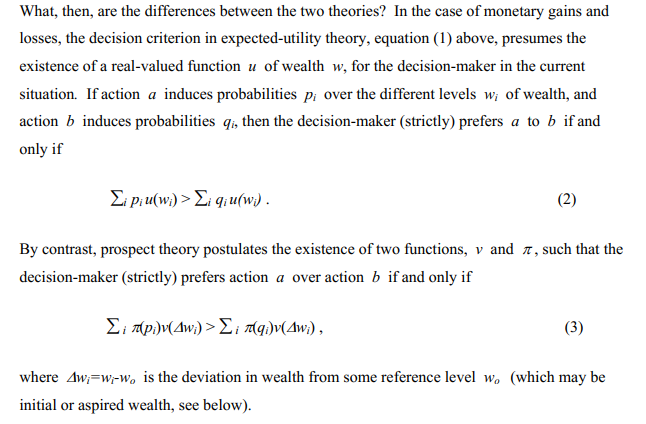
[ad_1]
Nobel prize winner Daniel Kahneman handed away right now. His work incorporating psychology into economics by Prospect Principle has been a serious advance. From the N.Y. Instances obituary:
Professor Kahneman delighted in declaring and explaining what he known as common mind “kinks.” Crucial of those, the behaviorists maintain, is loss-aversion: Why, for instance, does the lack of $100 harm about twice as a lot because the gaining of $100 brings pleasure?
Amongst its myriad implications, loss-aversion idea means that it’s silly to examine one’s inventory portfolio ceaselessly, for the reason that predominance of ache skilled within the inventory market will most probably result in extreme and probably self-defeating warning.
Loss-aversion additionally explains why golfers have been discovered to putt higher when going for par on a given gap than for a stroke-gaining birdie. They struggle tougher on a par putt as a result of they dearly wish to keep away from a bogey, or a lack of a stroke.
For a very good introduction of Kahneman’s contribution, one can learn the e book Considering, Quick and Sluggish. Extra technically, Prospect Principle helped to unravel a few of the key paradoxes in anticipated utility idea. From the Nobel Prize web site:
Departures from the von Neumann-Morgenstern-Savage expected-utility theories of selections below uncertainty had been first identified by the 1988 economics laureate Maurice Allais (1953a), who established the so-called Allais paradox (see additionally Ellsberg, 1961, for a associated paradox). For instance, many people choose a sure achieve of three,000 {dollars} to a lottery giving 4,000 {dollars} with 80% likelihood and 0 in any other case. Nonetheless, a few of these identical people additionally choose successful 4,000 {dollars} with 20% likelihood to successful 3,000 {dollars} with 25% likelihood, despite the fact that the possibilities for the features had been scaled down by the identical issue, 0.25, in each options (from 80% to twenty%, and from 100% to 25%). Such preferences violate the so-called substitution axiom of expected-utility idea…
One hanging discovering is that individuals are typically far more delicate to the best way an consequence differs from some non-constant reference stage (corresponding to the established order) than to the end result measured in absolute phrases. This concentrate on adjustments quite than ranges could also be associated to well-established psychophysical legal guidelines of cognition, whereby people are extra delicate to adjustments than to ranges of out of doors situations, corresponding to temperature or mild.
Furthermore, folks seem like extra adversarial to losses, relative to their reference stage, than attracted by features of the identical measurement.
And a few of the arithmetic behind prospect idea:

The important thing variations between anticipated utility and prospect idea: (i) anticipated utility cares about ranges whereas prospect idea evaluates adjustments in opposition to establishment [i.e., w vs. Δw], (ii) prospect idea permits the utility perform and danger preferences to for features relative to losses [i.e., u(w) vs. v(w)] ], and (iii) anticipated utility idea takes possibilities as given whereas prospect idea makes use of determination weights which account for a way people understand these possibilities [i.e., p vs. π(p)].
Whereas Prospect Principle doubtless represents real-world human decision-making processes extra precisely than anticipated utility idea, some criticisms of Prospect Principle can be that (i) with repeated video games, people typically revert to nearer to an anticipated utility framework and (ii) for researchers, figuring out a ‘establishment’ worth for every particular person is usually difficult in apply.
Nonetheless, the Nobel Prize was a lot deserved and the scientific contributions Kahneman (and his collaborator Amos Tversky) will reside on for posterity.
[ad_2]